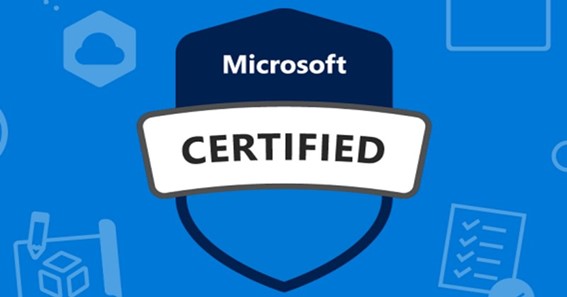Certifications enable an individual to find and improve their career prospects and facilitate professional growth. Among multiple credentials to multiply your IT profession, Microsoft training is one of the much-coveted certifications. If you are an IT professional and system or database administrator, such a certification can enhance your skills and increase your chances of getting hired or promoted.
Microsoft Certification: What is It?
Microsoft is mainly a software solutions corporation working in the technology sector. It offers technological explanations to meet the needs of corporates and individuals across the globe. These explanations may include enterprise management, development, productivity, cloud infrastructure, or data management sectors.
Microsoft certification training supports the technical skills you need regarding certain Microsoft technology-related tools and technologies. Microsoft proposes over 250 certificates for several proficiency levels for these tools and methodologies. Depending on the certification, you may have to renew it to incorporate all the latest elements.
Click here – Best Real Estate Investment in Islamabad – Guide 2022
Need for the Microsoft Training and Certification:
Having this certification proves that you have knowledge or skill regarding Microsoft products. It can benefit your career growth and enable you to find potential jobs seamlessly. For instance, having business intelligence certification can validate your skills and convey the same to the recruiters.
There are the following kinds of certification courses:
- Microsoft Certified Solutions Associate (MCSA): This certification program is ideal for candidates looking for entry-level jobs in an IT environment.
- Microsoft Solutions Developer (MCSD): This certification is ideal for developers. It authenticates your understanding of developing quick and flexible applications across numerous technologies.
- Microsoft Certified Solutions Expert (MCSE): This course is a pre-requisite for IT experts specializing in Microsoft server technologies.
- Microsoft Certified Educator Certificate: This course certifies that instructors or teachers have worldwide educator know-how literacy proficiencies. MCE is required to offer a deep, custom learning understanding for students. This certification is perfect for teachers-in-training, college teachers, and working educators.
- Microsoft Technical Associate (MTA) Certifications: This certification caters to individuals who intend to have a profession in server infrastructure, desktop infrastructure, or private cloud computing.
Benefits of Certification for Individuals:
Increases visibility: Microsoft training is offered by reliable institutes with a vast market share in the software and business enlargement niche. Since a large proportion of business establishments depend on Microsoft’s solutions, onboarding candidates certified as per Microsoft standards is ideal. As a result, having this credential enhances a candidate’s visibility among recruiters.
Highlights your commitment to attaining expertise: Showing enterprise by taking up a Microsoft course highlights that you are keen to achieve excellent proficiency levels in a particular tool or technology.
Highlights your aptitude to resolve technical glitches: Microsoft training certifications display your skill to offer custom resolutions for companies using Microsoft’s organizations. These include achieving critical technological know-how. Let’s say if you pursue a business intelligence course, you will receive practical training, technical knowledge, and soft skills to become a holistic business intelligence professional.
Advantages of Microsoft Certification for Businesses:
Increases customers’ confidence: Enabling your organization’s employees to have Microsoft certifications is highly constructive. It focuses on their abilities for using solutions offered by Microsoft, showing potential patrons that your company stays well-informed of the latest developments in the IT sector. Thus, this gives your business and workforce the esteem and confidence it deserves.
Highlights the expert standards of a corporate: There are industry criteria that come with arranging enterprise substructure. The best way for a commercial brand to showcase its consideration for these standards is by warranting its professionals to obtain the industry understanding and standards that come with such certifications.
Boosts efficiency levels: Studies carried out by industry frontrunners in the IT community have exhibited that workforces who acquire expert certifications are usually more prolific. Consequently, encouraging your employee to get Microsoft training proliferates an organization’s aptitude to troubleshoot concerns rapidly and develop resolutions.
Upsurges your assurance in employees: Prosperous businesses eradicate the necessity to micromanage all commercial operations when they trust their workforces. And personnel with Microsoft certifications offer business owners peace of mind when assigning tasks that entail using Microsoft infrastructure.
Sectors Where Professionals Need a Microsoft Training:
The following jobs either need or desire those candidates who have Microsoft certifications:
- IT specialist
- Software engineer
- Technical support specialist
- Web developer
- Software tester
- System administrator
- Azure cloud architect
Thus, Microsoft training unveils varied opportunities for experts employed in the IT industry while also guaranteeing that specialized professionals obtain the recognition their aptitudes deserve. In addition, the Microsoft certifications are appropriate for people just starting in technology or wondering about an occupation change.
Professionals with Microsoft certifications are generally employed as consultants, administrators, analysts, and similar roles.
Click here – What are the Dramatic Arts?
To Know Some Great Stuff Do Visit fyndblog
To Know Some Great Stuff Do Visit fixznow
To Know Some Great Stuff Do Visit turnoffme
